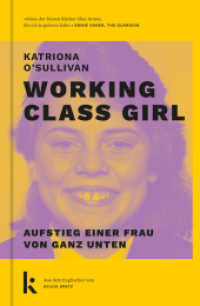- ホーム
- > 洋書
- > ドイツ書
- > Humanities, Arts & Music
- > Linguistics
Description
(Text)
How can literary archives adapt to the challenges of the future?Literary archives are per se international because their subject is international. Literature does not end at the borders of its country of origin or its language. Hence, literary archives hold material that is not limited to a country or a language, although one country and language is usually dominant. It might even be the case that an archive has the official task of preserving the literary heritage of a specific territory and is funded for this purpose.How can we conceptualize literary archives in their regional and global frameworks and develop them further? To what extent does digitization foster international cooperation within and beyond the archives and how can we make it more fruitful? How can archives meet the interests of the literary public and of researchers?With contributions by: Stephen Enniss, Lavinia Frey, Jeang-Yean Goak, Ben Hutchinson, David D. Kim, Stefan Litt, B. Venkat Mani, Nelson Mlambo, Sebastian Möring, Sandra Richter, Fred Studemann, Meike G. Werner, Katja Wiesbrock DonovanLiteratur endet nicht an den Grenzen ihres Herkunftslandes oder ihrer Sprache, Literaturarchive verfügen also über Material, das weder auf ein Land noch auf eine Sprache beschränkt ist. Internationale Forscherinnen und Forscher fragen, wie Literaturarchive in digitalen Zeiten in ihrem regionalen und globalen Rahmen konzeptualisiert und weiter entwickelt werden können.
(Text)
(Author portrait)
Sandra Richter, geb. 1973, Direktorin des Deutschen Literaturarchivs Marbach und Professorin für Neuere Deutsche Literatur an der Universität Stuttgart, Studium der Literaturwissenschaft und Politik an der Universität Hamburg, Promotion 1998 an der Justus-Liebig-Universität Gießen.Veröffentlichung u. a.: Eine Weltgeschichte der deutschsprachigen Literatur (2017). Sandra Richter






